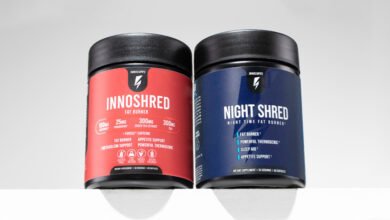BCAA Supplement: Here’s Why It’s Over-Glorified

Have you ever seen that local bodybuilder bro carrying a gallon jug of pink-tinted water at the gym?
Probably more often than not. It must take a pretty secure man to carry around such a girly looking drink.
But what the heck is it?
Most likely, it’s a bunch of different “branch-changed amino acids”, also known as BCAA’s. The biggest meat-heads (or should I say juice-heads) will say that BCAA supplements are totally worth it.
After all, it’s about as helpful as whey protein. It also packs just as much power as creatine, so it’s going to help build up your muscles and your strength.
Or so the maker of BCAA says.
Like most of the promises in the fitness world, you’ve got to take this with a grain of salt. Like, a lot of salt. Because the whole entire story isn’t being told here. While BCAAs actually have some pretty good stuff (and we will touch back on what “stuff” this is later) they aren’t as effective or successful as each company is making them out to be.
So we’re going to take a look into BCAAs. First, we’ll start with the basics…what are they? Let’s look into this…
When you start to exercise in a fasted state, you will lose some fat. A particularly effective exercise to do here, is weightlifting.
The best way to get the most out of your fasted state? Workout first thing in the morning, before you’ve had a bite of anything to eat. There’s also a hidden benefit here, if you’re in a fasted state for 6 or more hours, your body is going to be able to burn fat even more.
But like most things, there is a downside here…
Exercising in a fasted state is great for fat loss but it’s going to increase the breakdown of muscles. This isn’t great news because too much breakdown in muscles is going to impair your muscle growth in the long run.
But supplementing properly can help stop this.
BCAAs have leucine, which is key for suppressing the breakdown of muscles.
We know what you might be thinking, well can’t I just use food? No, you can’t and here’s why: your insulin levels are going to spike because of the food and you won’t be in a fasted state.
But, BCAAs have a lot less of an impact on insulin levels which is why a lot of people decide to supplement with them before they start training in a fasted state.
So even though BCAAs are a good solution keep your muscles strong, there are 2 pretty major downsides.
First, you’re going to pay the price of 3 amino acids, yet you’re really only getting one of them – and that’s leucine. Leucine is the only amino acid that’s going to work to help stop muscle protein breakdown. So you’ll probably save yourself a lot of money and get better results by just buying leucine by itself. Just a warning… it tastes pretty horrible.
The second downside is that a lot of BCAA supplements are made up of 2-3 parts leucine, with the other 1 part made of valine and isoleucine. So that means you need to take a good amount (about 10 grams) every single time.
In fact, you need about 3-5 grams of leucine in order to outweigh the loss of muscle that happens during a fasted exercise. So this means you’ll go through bottles and bottles of BCAAs pretty fast, especially if you plan on doing fasted training 5-7 times a week.
Don’t worry though! There’s another option. B-Hydroxy B-Methylbutyrate (we’re going to call this one HMB) is something your body makes on its own. It’s the substance that is created during the time your body is metabolizing leucine.
HMB is generally marketed to help muscle-building, but there isn’t any solid evidence. So we aren’t going to say that it’s going to do wonders for your muscle growth.

There’s pretty concrete evidence in one aspect– it acts as a successful anti-catabolic agent. So it’s going to help cut back on damaging muscle breakdown. This means you are going to see a faster recovery from your training and have a lot less soreness in your muscles. It’s the ideal thing to use when you’re doing fasted training.
-Terry Asher




